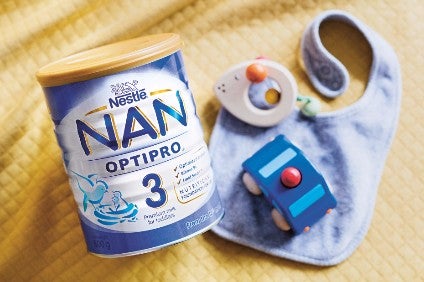
Switzerland-based food giant Nestlé is facing further criticism for giving “misleading advice on baby formula”.
Having previously slammed Nestlé? in a February 2018 report, campaign group Changing Markets Foundation – working with Globalization Monitor – has renewed its attack in a follow-up study published today (9 April), which claims that the company “continues to give contradictory nutritional advice on infant formula products in China and Hong Kong despite making a commitment to end this practice last year”.

Discover B2B Marketing That Performs
Combine business intelligence and editorial excellence to reach engaged professionals across 36 leading media platforms.
Nestlé denies the claims.
The campaign group charges Nestlé is “continuing to mislead parents and break the WHO [World Health Organization]’s marketing code with its infant formula milk products”.
It further states parents in the Far East pay up to 4.5 times more than UK parents for comparable Nestlé infant formula and concludes that Nestlé “continues to use science merely as a marketing tool”.
Changing Markets Foundation argues Nestlé has failed to act on a number of criticisms relating to the composition and claims of its baby milk formula product.
Its report says Nestlé continues to promote some of its products as healthier in Hong Kong and China (the fastest growing markets for infant formula) because they are free from vanilla flavourings but has not removed vanilla flavourings from other products in the same markets.
This is despite a pledge in March 2018 to remove the ingredient from its products.

US Tariffs are shifting - will you react or anticipate?
Don’t let policy changes catch you off guard. Stay proactive with real-time data and expert analysis.
By GlobalDataBut it concedes Nestlé has acted on one of its commitments, removing sucrose from its products for babies aged 0-12 months.
However, it claims Nestlé markets its products as being close to breastmilk or inspired by human milk, in breach of the WHO Marketing Code and subsequent resolutions.
Nusa Urbancic from the Changing Markets Foundation said: “If mothers cannot or choose not to breastfeed, companies like Nestle´ have a huge responsibility to provide products that are safe, nutritionally complete and informed by the best available science. Our report confirms that Nestlé continues to use science as merely a marketing tool, valuing higher profit margins over its scientific credibility.”
However, in a statement sent to just-food, Nestlé defended its approach.
A spokesperson said: “We apply the WHO code of marketing of breastmilk substitutes and subsequent WHA (World Health Assembly) resolutions as implemented by member states. We have put in place a number of compliance measures and mechanisms to ensure compliance. We encourage anyone with concerns regarding our practices to share them with us. We are determined to respond systematically.”
It added that “even though vanillin flavourings in follow-on formula (for infants from 6 to 12 months) are allowed by CODEX and local regulations, we have voluntarily decided to remove them from the few recipes that still contain. We are in the process of finding alternatives. We are also removing vanillin claims in new labels”.
And it denied making misleading marketing claims.
It said: “We do not use any statements that idealise our products or imply that they are superior to or equivalent to breastmilk on our infant formula labels or communications materials.
“Infant formulas have evolved and are compositionally closer to human milk than unmodified cow’s milk. As such, we communicate that products are ‘inspired by breastmilk’. For infants who cannot be fed on breastmilk as recommended, infant formula is recognized by WHO as the only suitable breastmilk substitute.”
It said pricing is determined by many factors “including import duties, local taxes, costs of production and distribution and trade margins”.





